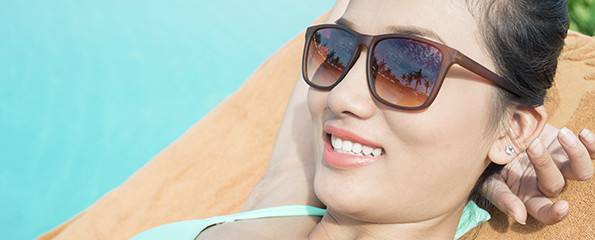Young Asians at greater skin cancer risk in Australia
New research from the University of Adelaide shows that young Asian Australians could be placing themselves at greater risk of developing skin cancer by engaging in “dangerous” sun behaviour.
Although cultural norms in Asia suggest that having lighter skin is preferable, research conducted in the University’s School of Psychology shows that some young Asian Australians want darker skin and many are deliberately tanning themselves, increasing their cancer risk.
The study, conducted by Dr Ashley Day for her PhD at the University, is the first of its kind aimed at better understanding the sun-related behaviours of young Australians of Asian background. Dr Day surveyed 140 Asian Australians aged 18-26 years. The results have been published in the European Journal of Cancer Care.
“Until now, little has been known about the perceptions of young Asian Australians of their skin tone and whether or not that affects their behaviour,” Dr Day says.
“Although the prevailing attitude among Asian cultures is that lighter skin is better, there were a number of young people in this group who desired darker skin than their own perceived skin tone. These people engaged in behaviours that put them at increased risk of skin cancer.”
More than half of the women and almost a third of the men surveyed had deliberately tanned themselves at least once in the past few years, and many of these had experienced at least one severe burn in the previous 12 months.
Dr Day says this demonstrates the impact of Australian culture on young people of Asian heritage.
“Studies from the United States show that as they adopt Western culture, people of Asian and Hispanic heritage engage in more tanning behaviour and decreased levels of sun protection,” she says. “This appears to be the case among young Asian people in Australia, with the potential for peer groups, media representations of beauty and celebrity, and overall sun culture influencing their attitudes and behaviour.”
Dr Day also found lower levels of understanding about skin cancer risks and sun health among this group.
“This can lead to a combination of increased risks for young Asian Australians: deliberate tanning to darken their skin, and a lack of awareness of skin cancer and its early signs, which may lead to delayed treatment and poor outcomes for patients,” Dr Day says.
“We believe increasing skin cancer knowledge in this group will be important. More research is needed to better understand the impact of Western culture on young people’s attitudes to skin health.”
(Source: The University of Adelaide, European Journal of Cancer Care)
Dates
Tags
Created by:

 Login
Login














